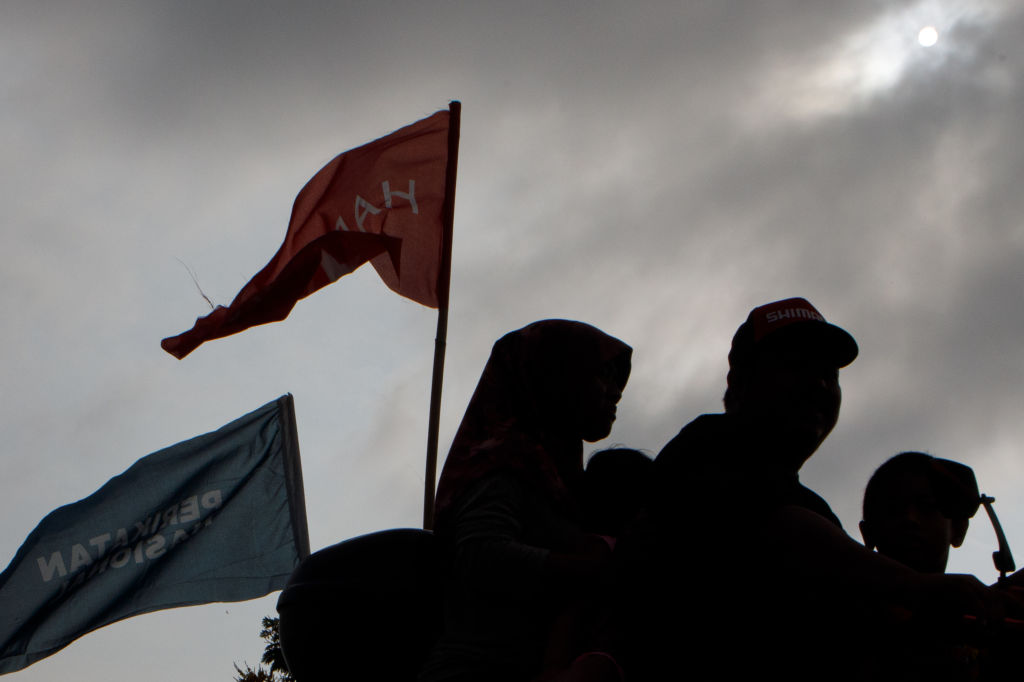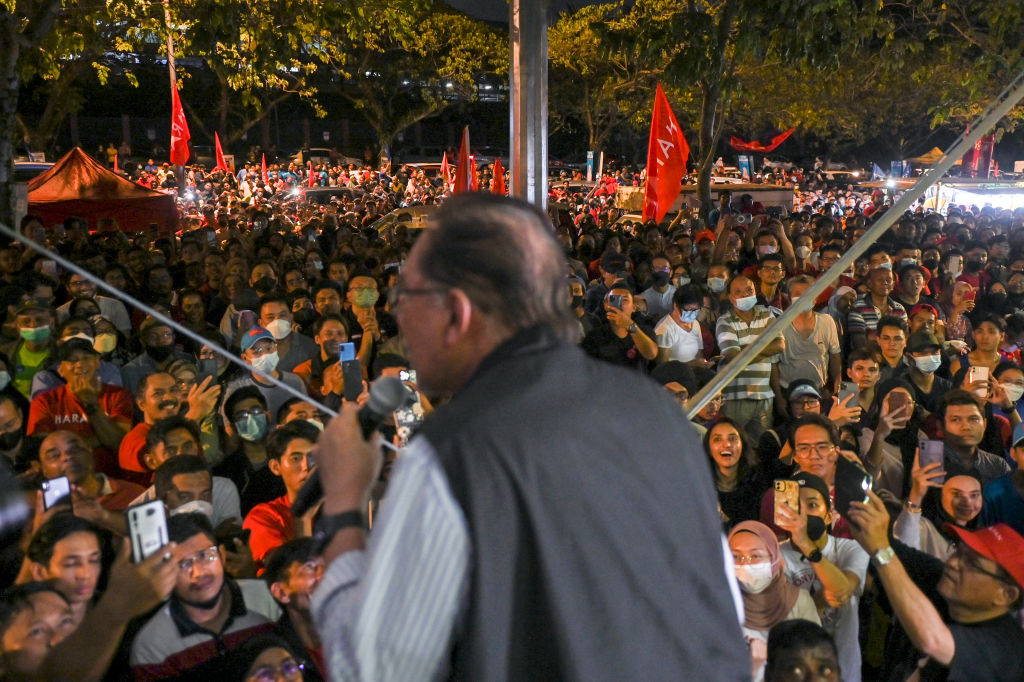
Nearly a decade ago, 1Malaysia Development Berhad (1MDB), Malaysia’s sovereign wealth fund, was found to have been embezzled of billions of dollars in a yearslong kleptocratic operation that spanned the cabinet of Malaysia to global financial institutions and Hollywood. It was one of the biggest financial scandals the world had ever seen, and the jailing of former Malaysian Prime Minister Najib Razak last year was supposed to put an end to the saga—but in Malaysia, the legacy of 1MDB lives on.
While 1MDB triggered nationwide discussions about corruption, since then, politicians left and right have lobbed corruption charges against each other while seemingly everyone across the political spectrum has campaigned on anti-corruption. At the same time, few convictions have come to pass, with cases appearing to drop depending on which way the political winds blow. All this has produced a jaded populace that has become largely resigned to corruption pervading the ranks of government and that has started to trend back toward Malaysia’s historically divisive identity politics.
Read More: U.S. Politicians Are Rarely Sued for Defamation. In Malaysia, It’s a Regular Occurrence
With Malays and indigenous communities making up 70% of Malaysia’s population while Chinese and Indian ethnicities take up less than 30%, racial and religious populism has long been a defining feature of Malaysian politics. A rare consensus on corruption was forged among the electorate across the racial divide post-1MDB, but experts say that the resurgence of identity politics in recent years comes as voters grow cynical about the government’s ability to effectively tackle Malaysia’s corruption problem.
“When 1MDB first came out, there was a hope of change. People back then, regardless of Malays or non-Malays, they could both agree on getting rid of corruption and the need for change,” Kevin Zhang, a senior research officer in the Malaysian studies program at Singapore’s ISEAS-Yusof Ishak Institute, tells TIME.
But, he adds, developments since then have only created disillusionment on the ground and “fundamentally altered the political discourse in Malaysia.”
Anti-corruption was one of the top priorities of Malaysia’s leaders who picked up the pieces after Najib. A watershed general election in 2018, held at a time when 1MDB loomed large over public consciousness, saw the ousting of the Barisan Nasional coalition, which had ruled the country for over six decades. Taking their place was Pakatan Harapan, a coalition that campaigned heavily on a platform of eliminating corruption.
Since then, anti-corruption rhetoric has continued to dominate Malaysian politics. Last year’s general election saw prime ministerial candidate Anwar Ibrahim present himself as the country’s lifeline towards clean politics. “Who can deny that the political elite have collected wealth for themselves at the expense of the people?” he said at a rally before the election, urging people to reject corrupt leaders.

When Anwar took the reins of a Unity Government—an alliance that includes both the coalitions Pakatan Harapan and Barisan Nasional—last November, tackling corruption was at the top of his reformist agenda. In one of his first initiatives as Prime Minister, Anwar ordered a review of government projects approved by past administrations, describing the earlier decision processes as improper.
But the yearslong anti-corruption drive promised by different leaders has thus far resulted in many charges and few convictions.
This week, the Malaysian High Court agreed to drop 47 graft charges against Deputy Prime Minister Ahmad Zahid Hamid, who’s also the president of the United Malays National Organization (UMNO)—the same party that Najib had led until 2018. Zahid had been accused of criminal breach of trust, bribery, and money laundering related to a charity foundation he founded, and was given a discharge not amounting to an acquittal on Monday upon an unexpected request from prosecutors.
The court said that the discharge was given, among “numerous other reasons,” so the prosecution could further investigate the charges—an explanation that has only sparked further outcry in civil society and among politicians both within and outside of Anwar’s Unity Government.
Zahid is just the latest in a string of politicians who have recently received favorable court decisions on corruption charges. Former Prime Minister Muhyiddin Yassin, who led the country from 2020 to 2021 and is now the chairman of the opposition coalition Perikatan Nasional, was charged with corruption in March, only to be similarly acquitted in August. And Najib himself was acquitted of tampering with a 1MDB audit report in March, though he is still serving a 12-year prison sentence for earlier graft convictions.
The recent dropping of charges against Zahid, in particular, has cast doubt on Anwar’s fervent anti-corruption rhetoric, along with speculations of political collusion. (Zahid is believed to have been pivotal in harnessing support for Anwar’s ascension to the premiership last year).
“All that anti-corruption and good government baloney was for the gullible people out there who still believe in reformasi,” former ambassador Dennis Ignatius wrote in a post on social media on Monday, after Ahmad Zahid’s discharge.
“The discharge is a minus for the Anwar government's standing,” says Ariel Tan, a senior fellow at Singapore’s S. Rajaratnam School of International Studies and the coordinator of its Malaysia program. Anwar’s Pakatan Harapan has already faced criticisms for partnering in its Unity Government with UMNO, which has struggled to shake off its association with the 1MDB scandal and corrupt reputation.
“By working with UMNO, Pakatan had lost the moral high ground on corruption, and it had not been able to connect with the younger voters either via its leadership or messaging,” she adds, pointing to Pakatan Harapan’s struggle to win support from younger voters at the state election in August.
Read More: Syed Saddiq Wants Young People to Have a Say in Malaysia’s Future
Malaysian youth are increasingly gravitating toward the opposition Perikatan Nasional, a nationalist coalition known for championing Islamic and Malay values. At the same time, despite the Unity Government’s calls for its opponents to stop playing the race card, some of its members have also been observed to fan racial anxieties, warning ethnic minorities of a trend of Islamization.
“Politics now has shifted away from corruption. … It has regressed back into racial and religious politics,” says Zhang.
Political analysts have voiced concerns about identity politics taking center stage in multi-racial Malaysia, and Malaysia’s King has warned that such polarization will “create large-scale disharmony in society.” But voters have simply become jaded with the neverending political drama.
“How the legacy of 1MDB lingers is almost a resignation among Malaysian masses—that it doesn't matter who you choose,” says Zhang. “Of course, it has brought down Barisan Nasional. But what more can you [do to] galvanize people, if people don't believe that there is any hope for change?”
More Must-Reads From TIME
- The 100 Most Influential People of 2024
- Coco Gauff Is Playing for Herself Now
- Scenes From Pro-Palestinian Encampments Across U.S. Universities
- 6 Compliments That Land Every Time
- If You're Dating Right Now , You're Brave: Column
- The AI That Could Heal a Divided Internet
- Fallout Is a Brilliant Model for the Future of Video Game Adaptations
- Want Weekly Recs on What to Watch, Read, and More? Sign Up for Worth Your Time
Contact us at letters@time.com